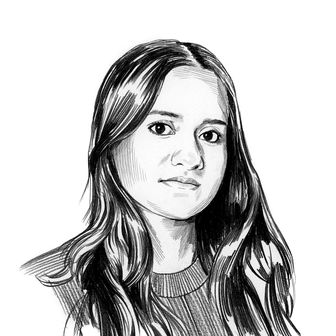
In a decrepit Dutch farmhouse in Hudson, New York, Greta — the 45-year-old protagonist of Jen Beagin’s splashy new novel, Big Swiss — spends her days as a medical transcriptionist for an eccentric sex therapist. It’s banal work until Greta transcribes for “Big Swiss,” a married 28-year-old Swiss gynecologist who comes in because she’s never had an orgasm. She was also nearly beaten to death several years ago by a man who will soon get out of prison, but she’s not here to talk about that. “I’m not one of those trauma people,” Big Swiss declares. “Trauma people” — those overly attached to their victimhood and who “act retraumatized” when asked to let it go — “are almost as unbearable as Trump people.” It’s not that Big Swiss is unsympathetic (“Yes, what happened to you is shitty, I’m not denying that”) but rather that she’s intensely pragmatic (“Why do you keep rolling around in your own shit?”). Listening in, Greta is transfixed, and the two soon strike up a life-altering affair.
There’s a recent trend in fiction to reduce characters to their dark backstories, using their trauma to conveniently explain everything they think, do, and feel — what critic Parul Sehgal calls the trauma plot. But Big Swiss is a refreshingly anti-trauma-plot novel, posing the question: Does self-victimization come at the cost of an interesting or, at the very least, okay life?
Beagin presents her two heroines as opposite models for coping with formative wounds. While Big Swiss never indulges her past, Greta is resigned to rumination. When the novel begins, her life is consumed by her own suffering. She constantly writes letters to her mother, who killed herself when Greta was a teenager, and drifts through life wondering if she’ll inevitably go down the same path. It’s easy to imagine a trauma-plot version of Big Swiss in which Greta’s life ends in suicide and Big Swiss finds herself trapped in a world of monstrous men. But the women of Beagin’s story buck those fates. Instead, they give each other countless orgasms as their dogs hump in the corner of Greta’s farmhouse. The women act in ways that show their futures aren’t predetermined by their pasts. They make strange, illogical, and frequently destructive choices. The book is wry, fresh, and absorbing, without flashbacks, maudlin confessions, or self-seriousness.
But to what extent is it possible to go through something shitty without becoming a trauma person? Big Swiss is dissatisfied with her marriage and the kind husband collecting shivs to protect her; intimacy with him feels “like walking the dog and drinking wheatgrass at the same time.” She enjoys choking in bed, can’t watch small dogs get harassed at the dog park without physically intervening, and, most notably, can’t quit Greta, a woman attached to her victimhood, no matter the cost of their affair. The effects bleed through even if she doesn’t believe in them.
As a trauma person myself, at least by Big Swiss’s definition of the term, the question made me sweat. It’s exhausting to be a survivor experiencing ugly and intrusive flashbacks. Like Greta, I aspired to Big Swiss’s model of simply setting down your baggage and pressing on. Her impenetrability sometimes alienates Greta, for whom the will to fuck is easier to muster than the will to live. Is Big Swiss strong because she’s resilient, or simply because the attack is the only bad thing that’s ever happened to her, allowing her to maintain what Greta calls the “the expectation that things will go your way, because they probably will, because they probably already have”?
Of course, things don’t go anyone’s way. Beagin delivers harsh lessons to both Greta and Big Swiss, suggesting that neither of their approaches to healing is the better than the other. You could do everything in your power to leave the past behind and it could still find you anew. None of it, Beagin seems to say, changes the fact that the future is still wide open and unpredictable. Your hurt does not exempt you from living.


